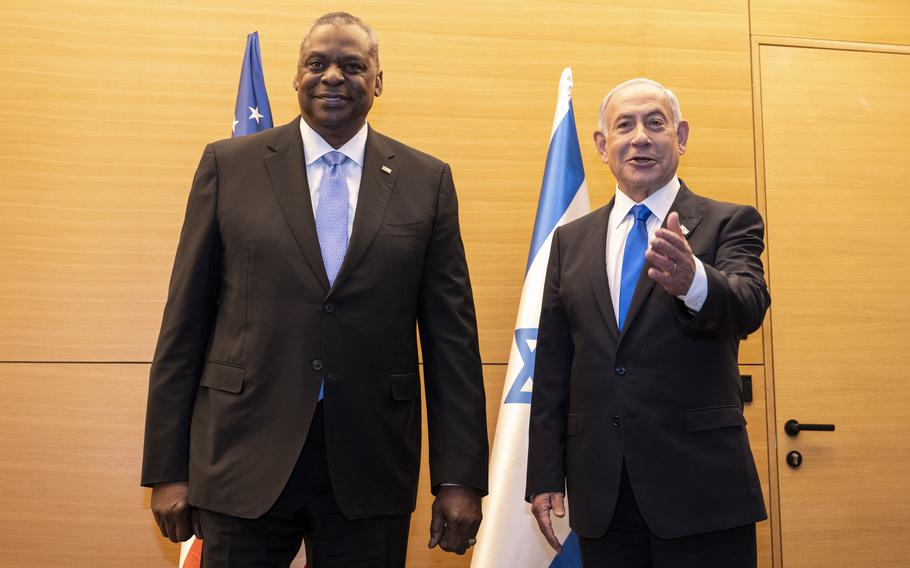
Secretary of Defense Lloyd J. Austin III meets with Israeli Prime Minister Benjamin Netanyahu in Tel Aviv, Israel, to discuss regional security, opportunities to expand military cooperation, and escalating violence in the West Bank, March 9, 2023. (Alexander Kubitza/Defense Department)
WASHINGTON — Defense Secretary Lloyd Austin pushed back Tuesday during a Senate hearing against a plan by House Republicans to pass stand-alone funding for Israel, telling senators money for the war in Ukraine must also be included in national security aid being considered by Congress.
His appeal to the Senate Appropriations Committee alongside Secretary of State Antony Blinken came a day after Republicans in the House proposed allocating $14 billion for Israel’s fight against Hamas militants and paying for it by cutting funding for the Internal Revenue Service.
The White House last week asked Congress for $105 billion in emergency funding, including $10.6 billion for Israel’s air and missile defense and $61 billion for Ukraine’s nearly two-year war against invading Russian forces.
“In both Israel and Ukraine, democracies are fighting ruthless foes who are out to annihilate them. We will not let Hamas or [Russian President] Putin win,” Austin said. “Today’s battles against aggression and terrorism will define global security for years to come.”
Austin and Blinken sought to tie the fate of Israel and Ukraine together and said helping both at the same time would strengthen U.S. security.
Blinken said the conflicts in Ukraine and the Middle East have “clear links” as Russia increasingly turns to Iran for weapons and supplies its own advanced military technology to the country in return. Iran is the largest financial backer of Hamas and its proxies have launched repeated attacks on U.S. forces in Iraq and Syria in recent weeks.
“Russia could stop this, but it doesn’t. Instead, to the contrary, its government is hosting Hamas for talks in Moscow, Iran is sending [drones] to Russia to attack Ukrainian civilians. So we’re seeing the profound connections here,” Blinken said.
His testimony was repeatedly interrupted by protesters calling for a ceasefire in Gaza, the Palestinian territory governed by Hamas and blockaded by Israel and Egypt. The enclave has been under bombardment by Israel since Hamas stormed into Israel earlier this month and killed 1,400 people.
Dozens of protesters seated in the audience drew attention to the Palestinian death toll, believed to be more than 8,000, by holding up hands covered in red paint and chanting “let Gaza live.”
Blinken acknowledged the activists after they were escorted out and said he understood “the passions expressed in this room and outside this room.” He said the U.S. remains committed to protecting civilians “but all of us know the imperative of standing up with our allies and partners when their security, when their democracies are threatened.”
Austin said it was important to remember what happens in Israel and Ukraine has repercussions for the U.S. and the world. He warned that abandoning Ukraine would not only ensure a Russian victory but embolden American adversaries, including China.
“I can guarantee you that without our support, Putin will be successful,” he said. “While the Ukrainians have done amazing work with our help in terms of the things that we provided them. If we pull the rug out from under them now, Putin will only get stronger.”
A major part of Austin’s pitch for additional Ukraine aid also centered on the benefits to the defense industrial base. He said $50 billion of the White House’s supplemental aid request would flow to defense manufacturers and create jobs across the country.
“The first four supplementals that we asked you for and we received bipartisan support on — over $27 billion of that money was invested in over 30 states here in the United States,” he told senators. “That’s real money going in the pockets of Americans.”
Sen. Patty Murray, D-Wash., chairwoman of the committee, said the panel was drafting “strong bipartisan legislation” to bundle Ukraine and Israel aid together. She emphasized “huge, super majorities” in the Senate and House favor more support for Ukraine despite some Republican skepticism.
“All of our adversaries are watching closely to see whether we have the vision to recognize how these crises are related and the resolve to come together and respond forcefully to them,” she said. “Our adversaries are cheering for dysfunction. So let’s instead show them unity.”
The House could take up its stand-alone Israel bill later this week. It has little chance of gaining traction in the Senate, with Senate Majority Leader Chuck Schumer, D-N.Y., on Tuesday calling the legislation “partisan and woefully inadequate.”